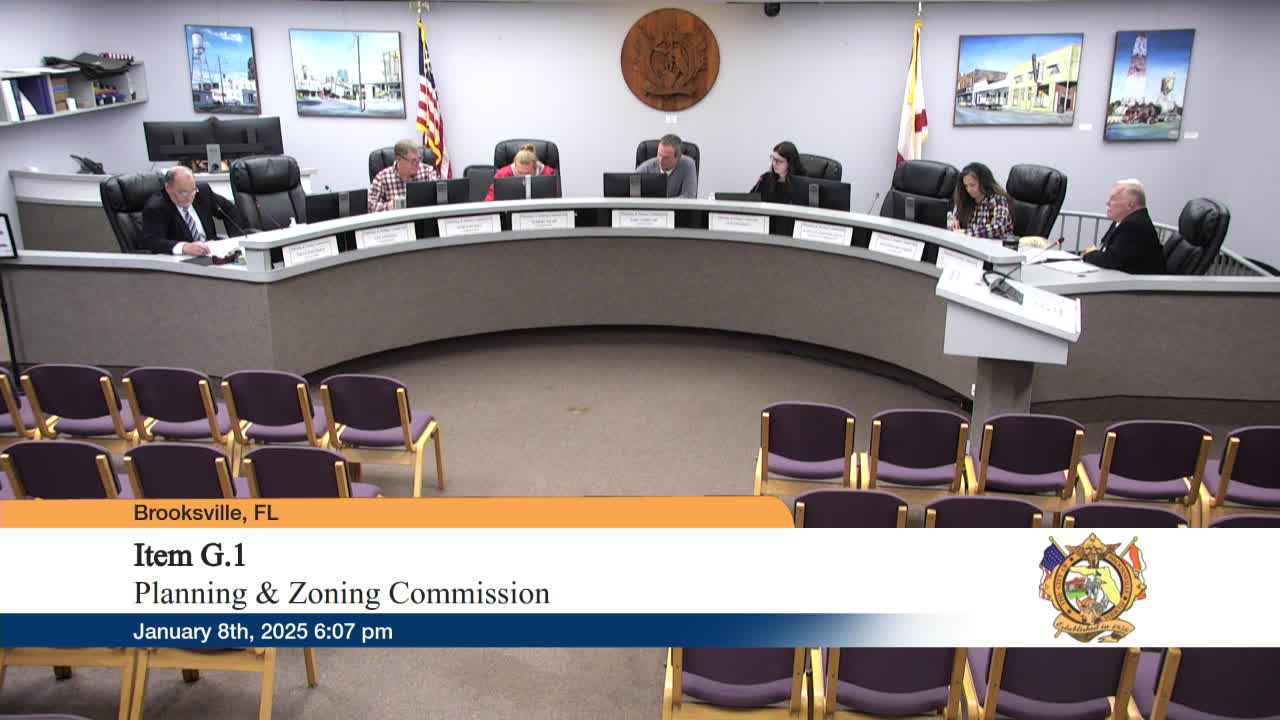Brooksville planning commission recommends council adopt ordinance to allow regulated outdoor dining and alcohol in downtown overlay
Get AI-powered insights, summaries, and transcripts
Subscribe
Summary
On Jan. 8, 2025 the Brooksville Planning and Zoning Commission voted unanimously to recommend City Council adopt Ordinance 992, which would remove certain special districts and replace them with an overlay permitting event-based outdoor dining and controlled alcohol service in a defined downtown area.
On Jan. 8, 2025 the City of Brooksville Planning and Zoning Commission voted to recommend that the City Council adopt Ordinance 992, which would remove specified special districts in Article 3, Parts 3–7 of the land development regulations and replace them with an overlay permitting regulated outdoor dining and limited alcohol service during approved events in the downtown core.
David, the staff presenter, said the change follows the end of the Development of Regional Impact (DRI) framework and would instead create an overlay similar to those used in nearby municipalities. He described the overlay as an "entertainment zone" that would allow restaurants to serve meals and alcohol outdoors under event procedures, subject to time limits, required use of a designated plastic cup, and other controls he said are standard in comparable districts. David said the Community Redevelopment Agency (CRA) would sell the required disposable cups and that the city manager would approve event setups, which the city could revoke if needed.
The proposal the commission reviewed targets a stretch of South Brooksville Avenue (the presenter identified the portion between Broad and Liberty streets as the immediate focus) and is intended to formalize outdoor dining and event activity in that block. David said events could be sponsored by private organizers or by the city and that the size of the area used would be determined on a per-event basis. He noted other municipalities that use similar overlays, and said one nearby jurisdiction reported a single arrest after adopting the model; he described that as an exception rather than a pattern.
Commissioners asked for clarification about the limits of the overlay — whether it would automatically include the entire district and how event footprints would be set — and staff answered that the city manager's approval would set event areas and that approvals could be revoked. Commissioners also discussed plans to add seating and formalized public-space amenities in the street to encourage lingering rather than transient drinking. David said the overlay is intended to support downtown restaurants and increase evening activity; he told the commission the downtown core attracted "about a half 1000000 people" last year (statement in transcript; presenter did not clarify whether that figure meant roughly 500,000).
After discussion, a commissioner made a motion to recommend City Council adopt Ordinance 992; another commissioner seconded the motion. The commission voted "all in favor," and the recommendation passed. The Planning and Zoning Commission's action is a recommendation only; final adoption would require City Council action and any additional conditions or approvals the council imposes.
The commission packet included a map of the proposed improvement district and the draft ordinance language. Staff said the overlay would include event procedures, time limits, required disposable cups, and that operation within the overlay would be subject to city manager approval and revocation.
Next steps: The commission forwarded its recommendation to the City Council for consideration. The ordinance, if adopted by council, would alter local land-development rules to allow regulated outdoor dining and event-based alcohol service in the specified overlay area; staff did not provide a firm implementation timeline at the commission meeting.
